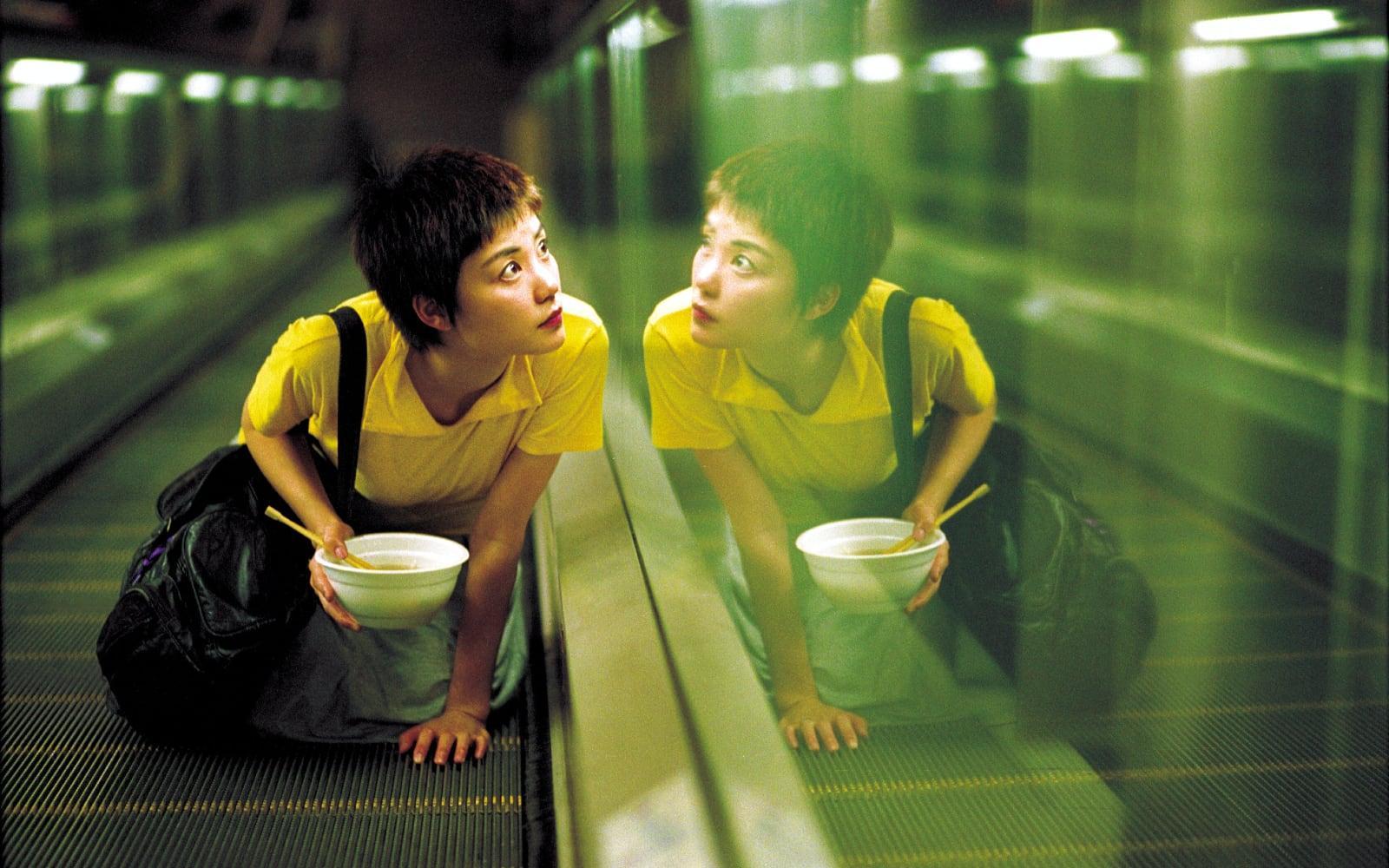Chungking Express by Wong Kar-Wai (Review)

When most people think of Hong Kong Cinema, two names immediately come to mind: John Woo and Jackie Chan. The former is famous for his bloody, violently poetic films of honor, trust, and loyalty among thieves; the latter is famous for his combination of furious kung fu and slapstick comedy (not to mention risking his life every film). Speaking for myself, I was unaware of much of the other cinema that Hong Kong has produced.
Thankfully, Chungking Express opened my eyes.
Chungking Express is not a chop-socky flick, nor is it a “heroic bloodshed” film. I’d probably have to say it’s more along the lines of a romantic comedy, but unlike most romantic comedies I’ve seen. And even though it’s nothing like it’s more action-packed cinematic cousins, it still bubbles with its own sense of energy. The film consists of two different stories of love lost and love found. Although the stories are, by and large, independant of eachother, they are slightly woven together (which becomes more apparent with repeated viewings). Characters from the second story appear in the first, and events that happen in the first story come around again, albeit in odd ways, in the second. And both stories hover around Chungking Express, a small restaurant whose owner dispenses words of wisdom concerning love and romance.
The first story is about He Qiwu, a young Hong Kong police officer on the eve of his 25th birthday. He broke up with his girlfriend one month ago and has been waiting for things to be reconciled. As such, he develops the odd habit of buying cans of pineapple (his girlfriend’s favorite fruit) with the expiration date on his birthday. If she doesn’t call him by his birthday, he’ll eat all of the fruit and move on. Enter the mystery woman, played by Brigitte Lin, who is involved with a drug smuggling operation. When it goes awry, she crossed paths with Qiwu, who falls in love with her. After spending the night with her (but not in that way), he learns to move on.
The second story concerns another police officer (played by the great Tony Leung) who has recently broken up with his stewardess girlfriend and frequents Chungking Express. There, he meets the perky Faye (Wong), who has just started working there. She develops a crush on him, eventually gains access to his apartment, and begins to rearrange his life, slowly removing traces of his old girlfriend and taking her place.
Of the two stories, I found the second one to be the best. This is due, in no small part, to the two leads of Leung and Wong. Although I’ve only seen a couple of his films, I’ve really grown to like Leung’s acting (he’s excellent in “Bullet In The Head” and “Hard Boiled”). Especially amusing are the scenes of him talking to various items in his apartment, telling them to “cheer up” after his girlfriend has left him.
However, it’s Faye Wong who steals the show. This was her first movie, but she’s like a breath of fresh air on screen. I hate using the word “cute,” but I feel I can use it in this case and not be demeaning. The first story isn’t bad, and in reality, may be the “deeper” story. Lin is pretty good as the aloof, no-nonsense woman, and Kaneshiro brings a certain desperation to his character, who is determined to woo Lin. However, it doesn’t have the zest of the second story.
Most of the film’s energy is due to the quirkiness of the stories. Although I’ve left out certain details, suffice to say, both stories (the second one especially) have a lot of whimsy and silliness. If that’s not your cup of tea, they might seem silly and stupid. However, I thought it was a lot of fun. Not “laugh out loud” fun, but fun nonetheless.
Another reason for the film’s energy is the shooting style. If there is one similarity to be drawn between this film and more famous Hong Kong works, it’s the camerawork which nevers feels like it stands still for too long.
In the first story, it’s used to show the seamier side of Hong Kong, especially as we follow Lin’s character on her journeys through the alleys and streets. In the second story, it highlights the odd intentions of Faye, as she invites herself into Leung’s apartment and begins to recreate his life. We often watch her cavort and frolic in his apartment to the sounds of “California Dreaming” and the Cantonese version of The Cranberries’ “Dreams” (sung by Wong, no less).
All in all, Chungking Express is a fun, offbeat little film that showed me there’s more to Hong Kong cinema than heroic bloodshed and kung-fu. I don’t think it’s for everyone, simply because most people will dismiss its lighter moments as too silly and complain it’s “darker” moments aren’t “dark enough.” I’ll admit that some of the offbeat moments, especially some of Faye’s antics, get a little out there.
If there is one major complaint I have, it’s that I couldn’t really connect too any of the characters on an emotional level, and this is supposed to be lovelorn strangers and all that. Much of the emotional impact some of the scenes could have had is sacrificed for the sake of being quirky and offbeat. However, I still feel that quirkiness is able to carry most of the movie, and that works for me.
